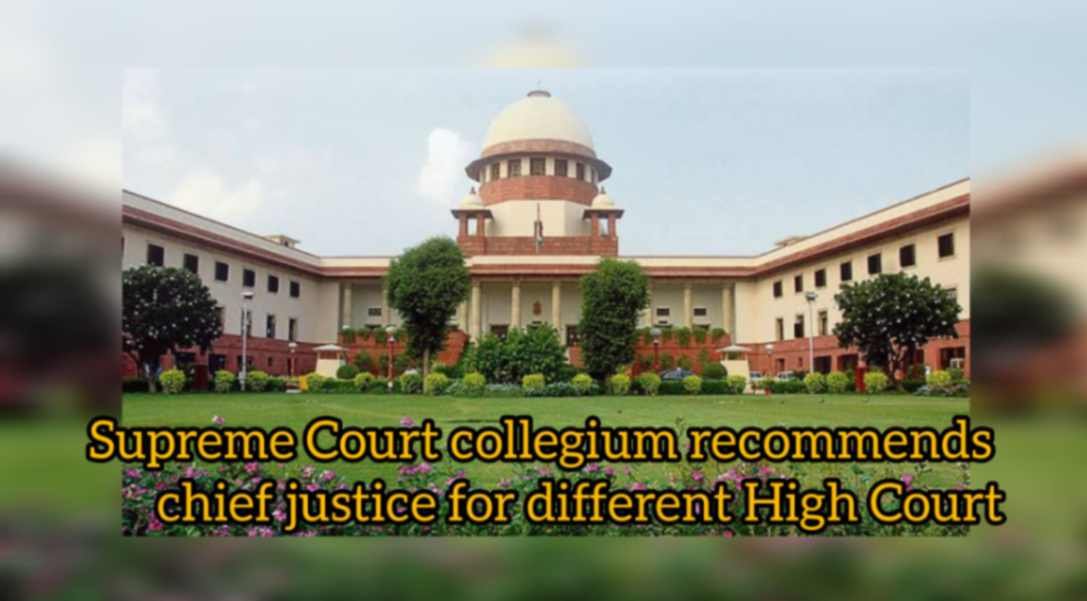Supreme Court Collegium Recommends Chief Justices for different High Courts
Introduction: The Supreme Court Collegium, led by Chief Justice Dhananjaya Y Chandrachud, Justice Sanjiv Khanna, and Justice B R Gavai, has recently put forth recommendations for the appointment of Chief Justices in various High Courts across the country. This significant move aims to bolster the judicial leadership in different regions, ensuring a robust legal framework. Let’s delve into the profiles of the esteemed nominees and explore their distinguished careers, legal expertise, and contributions to the judiciary.
Justice B R Sarangi – Jharkhand High Court
Justice B R Sarangi, with an illustrious career, emerges as the nominee for the Chief Justice position at Jharkhand High Court. Elevated as a Judge of the High Court of Orissa in June 2013 after 27 years of practice at the Bar, Justice Sarangi boasts a wealth of experience across various legal domains. His tenure as a High Court Judge, marked by over 1056 reported judgments, reflects a commitment to dispensing justice and a profound understanding of legal intricacies.
Justice Arun Bhansali – Allahabad High Court
Justice Arun Bhansali, recommended for the Chief Justice role at Allahabad High Court, brings a diverse legal background to the table. His judicial journey commenced with his appointment as a Judge on January 8, 2013, following an extensive career practicing law at the Jodhpur Bench. With specialization in civil, company, Constitutional, and taxation cases, Justice Bhansali’s nearly eleven years as a High Court Judge have seen him authoring over 1230 reported judgments, showcasing his expertise and competence in various legal spheres.
Justice Vijay Bishnoi – Gauhati High Court
The recommendation for the Chief Justice position at Gauhati High Court is Justice Vijay Bishnoi, whose legal journey spans practice at the Rajasthan High Court and the Central Administrative Tribunal in Jodhpur. With a focus on civil, criminal, Constitutional, service, and election cases, Justice Bishnoi’s judicial career of nearly eleven years has been marked by 652 reported judgments. His reputation for upholding professional ethics and displaying impeccable conduct underscores his suitability for this esteemed role.
Justice Sheel Nagu – Punjab and Haryana High Court
Justice Sheel Nagu, nominated for the Chief Justice role at Punjab and Haryana High Court, has served as a Judge of the High Court of Madhya Pradesh since May 27, 2011. His practice at the High Court of Madhya Pradesh, specializing in Constitutional, service, labour, and criminal cases, laid the foundation for a judicial career spanning over 12 years. With more than 499 reported judgments, Justice Nagu is recognized as the seniormost puisne Judge in his parent High Court, embodying competence, integrity, and a high standard of professional ethics.
Justice Manindra Mohan Shrivastava – Rajasthan High Court
Currently serving as Acting Chief Justice, Justice Manindra Mohan Shrivastava is the recommended nominee for the Chief Justice position at Rajasthan High Court. Elevated as a Judge of the High Court of Chhattisgarh on December 10, 2009, and later transferred to the Rajasthan High Court in 2021, Justice Shrivastava’s legal journey includes practice at the District Court, Raigarh, and the High Courts of Madhya Pradesh and Chhattisgarh. His specialization in Constitutional, service, taxation, labour, civil, and criminal cases, coupled with over 505 reported judgments, underscores his suitability for this crucial role.
Conclusion
The recommendations made by the Supreme Court Collegium signal a strategic effort to strengthen the judiciary by appointing highly qualified and experienced individuals to the position of Chief Justices in various High Courts. Each nominee, with a distinctive legal background and a track record of delivering justice, brings a unique perspective and skill set to their respective roles. As these nominees assume leadership positions, their contributions are poised to shape and enhance the legal landscape across the nation.
Frequently asked questions
What is the Supreme Court Collegium, and what role does it play in the appointment of Chief Justices?
The Supreme Court Collegium is a body of senior judges, headed by the Chief Justice of India, responsible for making recommendations on the appointment and elevation of judges in the higher judiciary. In the context of the above topic, the Collegium, comprising Chief Justice Dhananjaya Y Chandrachud, Justice Sanjiv Khanna, and Justice B R Gavai, has recommended the names of judges for appointment as Chief Justices of various High Courts.
How are the nominees selected for the position of Chief Justice in different High Courts?
The nominees for the position of Chief Justice are selected based on their legal expertise, experience, and contribution to the judiciary. The Collegium considers factors such as the judge’s track record, reported judgments, specialization in legal domains, and overall competence. The recommendations aim to ensure that the appointed Chief Justices possess the necessary qualifications and qualities to lead their respective High Courts effectively.
How does the recommendation process contribute to the overall strengthening of the judiciary in India?
The recommendation process by the Supreme Court Collegium aims to appoint highly qualified and experienced individuals to leadership positions in various High Courts. This strategic effort contributes to the overall strengthening of the judiciary by ensuring that Chief Justices possess the necessary skills to lead, interpret and apply the law effectively. The appointments are crucial for maintaining the integrity and efficiency of the judicial system, ultimately benefiting the legal landscape across the nation.

























